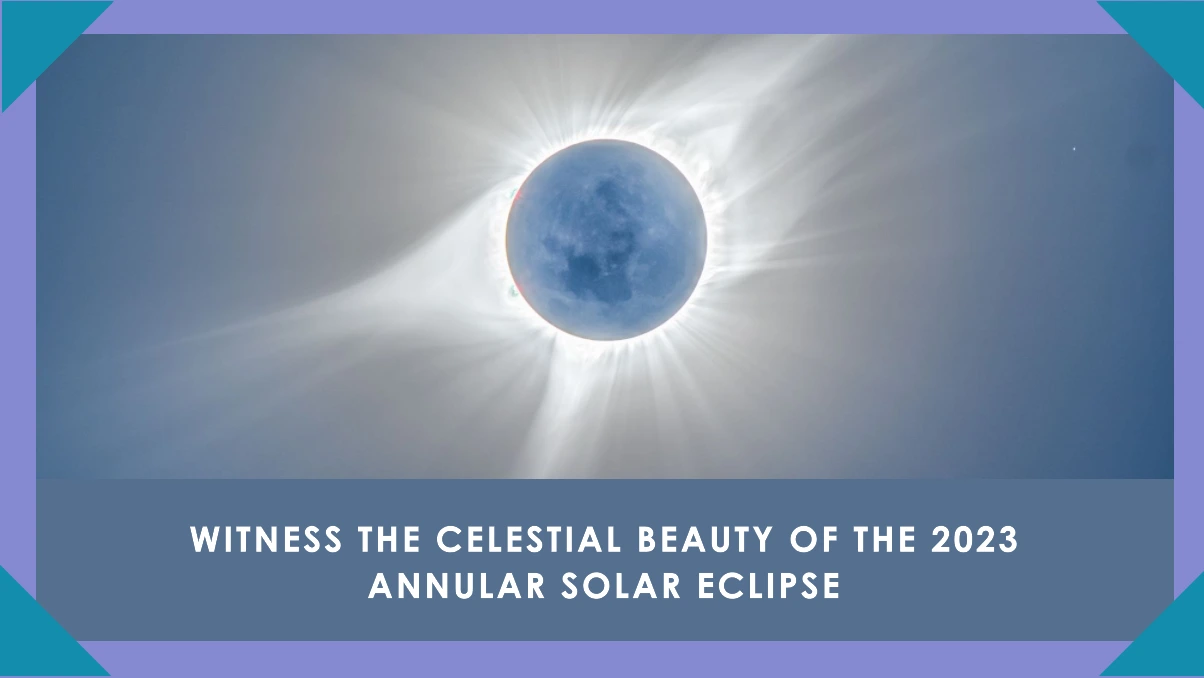Eclipses have always captivated human imagination, evoking a sense of wonder and awe. Among the various types of eclipses, the annular solar eclipse stands out for its striking “Ring of Fire” appearance. On October 14, 2023, skywatchers will have the opportunity to witness this breathtaking celestial event. In this blog, we will delve into the details of the 2023 Annular Solar Eclipse, from its definition and significance to where and when it can be observed.
What is an Annular Solar Eclipse?
An annular solar eclipse occurs when the Moon passes between Earth and the Sun but does not completely cover the Sun’s disk. This unique phenomenon happens when the Moon is near its apogee, the farthest point from Earth in its elliptical orbit. As a result, a thin, fiery ring of the Sun remains visible around the Moon’s dark silhouette, creating the mesmerizing “Ring of Fire” effect.
Key Characteristics of an Annular Solar Eclipse
| Characteristic | Description |
| Occurrence | Moon partially covers the Sun |
| Appearance | “Ring of Fire” around the Moon’s edge |
| Moon’s Position in Orbit | Near apogee (farthest point from Earth) |
| Celestial Alignment | Sun, Moon, and Earth aligned in a straight line |
The Significance of Annular Solar Eclipses
Annular solar eclipses are not just stunning celestial events; they also hold significance in the realm of astronomy and cultural symbolism. Here are some aspects of their significance:
1. Scientific Insights
Annular solar eclipses provide scientists with valuable opportunities to study the Sun’s outer atmosphere, known as the corona. During these eclipses, the corona becomes visible, allowing researchers to gather data and insights into this enigmatic region.
2. Cultural and Mythological Significance
Throughout history, solar eclipses have been associated with various myths, legends, and cultural beliefs. In some cultures, they symbolize cosmic events or signify changes in power and leadership. Understanding these cultural interpretations adds depth to the eclipse experience.
3. Celestial Synchronization
Annular eclipses are a testament to the precision of celestial mechanics. The alignment of the Sun, Moon, and Earth in a straight line during an annular eclipse is a reminder of the intricate dance of celestial bodies in our solar system.
Where and When to Witness the 2023 Annular Solar Eclipse
The 2023 Annular Solar Eclipse will be visible from specific regions across the Americas. To make the most of this celestial spectacle, it’s essential to know when and where to look up at the sky. Here are the key details:
Viewing Information for the 2023 Annular Solar Eclipse
| Aspect | Information |
| Date | October 14, 2023 |
| Geographic Path | North, Central, and South America |
| Visibility in the USA | Eight states in the Southwest |
Detailed Viewing Information
The eclipse will occur on October 14, 2023, making it a date to mark on your celestial calendar. While it will be visible from several regions in the Americas, the “Ring of Fire” effect will be most prominent in specific areas.
The Path of the Eclipse
The eclipse’s path will cross North, Central, and South America, offering varying degrees of visibility along its trajectory. While the entire path will witness a partial eclipse, the “Ring of Fire” will be visible from specific locations.
Visibility in the United States
For skywatchers in the United States, the 2023 Annular Solar Eclipse will be a remarkable event. It will be visible from eight states in the Southwest, providing a front-row seat to this celestial show.
To ensure you have the best experience during the eclipse, consider the following tips:
- Safety First: Never look at the Sun directly without proper eye protection. Use solar eclipse glasses or solar filters on telescopes and binoculars to safeguard your eyes.
- Plan Your Location: Determine the eclipse’s visibility in your region and choose a suitable location with an unobstructed view of the Sun.
- Timing is Crucial: Be aware of the precise timing of the eclipse for your location. Arrive early to set up your equipment and enjoy the entire event.
- Document the Eclipse: Capture this celestial phenomenon through photography or video to create lasting memories.
Conclusion
The 2023 Annular Solar Eclipse promises to be a celestial spectacle that skywatchers and astronomers alike eagerly anticipate. As the Moon partially covers the Sun, creating the iconic “Ring of Fire,” we are reminded of the grandeur and precision of our solar system.
Mark your calendar for October 14, 2023, and prepare to witness this awe-inspiring event if you are in one of the fortunate regions. Remember to prioritize safety and take the necessary precautions while observing the eclipse.
As we marvel at the wonders of the cosmos, may this celestial event serve as a reminder of the beauty and complexity of the universe we inhabit.
With this comprehensive blog, you have all the information you need to prepare for and appreciate the 2023 Annular Solar Eclipse. Whether you’re a seasoned astronomer or a curious skywatcher, this celestial event is bound to leave a lasting impression on anyone fortunate enough to witness it.
